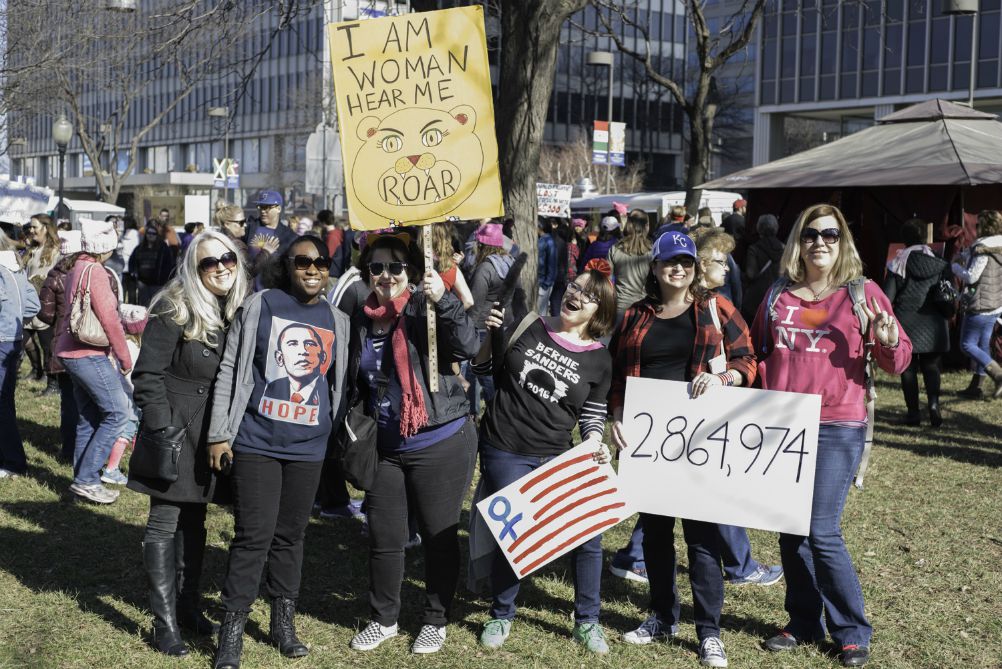
Participants at the Women's March, Kansas City, Missouri, Jan. 21, 2016 (NCR photo/George Goss)
Lately my favorite way to add gray to my hair is to watch the show "The Handmaid's Tale" on Hulu. Based on the novel by Margaret Atwood, the story is set in a dystopian present in which the United States is a totalitarian nation, a fundamentalist interpretation of the Bible is law, and fertile women are forced to be surrogates for barren women. From what I can tell after seven episodes, all the barren women are married to wealthy men in positions of power. All the characters who aren't "commanders" or their wives are militia, servants or handmaids.
I watch it because a coworker recommended it, though she said it was scary. She didn't mean this in the seasonal, Halloween way. She meant "The Handmaid's Tale" is scary because it's so plausible.
It may seem ridiculous or paranoid to even imagine a future in which women are not allowed to read, write, work or own property, in which their place is in the home and their primary contribution to society is the replenishment of a low population, but it's neither ridiculous nor paranoid when you consider the culture such a future could grow out of. "The Handmaid's Tale" could happen in a culture nostalgic for "simpler times" or for when the country was "great." In a culture in which women are expected to graciously accept unwanted advances, comments and physical contact from men as they walk down the street or take public transit. In one in which masculinity is so entwined with ideals of financial provision and brawn that men who found years of well-paying work through physical labor mourn mechanization and globalization and even see these forces as attacks on their manhood. In one in which religious liberty somehow always comes with the need to oppress someone or restrict other people's rights.
It's a slide from where we currently are, a dance with only a few uncomplicated steps. Over the past few years, men with famous names — Harvey Weinstein, Bill Cosby, Bill O'Reilly, R. Kelly, Julian Assange, Donald Trump — have made headlines after multiple women, sometimes up to 40, accused them of sexual harassment and/or assault. Each time, we have a national conversation about sexual harassment, sexualized violence and how women should be treated. Each time, activists, attorneys, survivors and other experts appear on talk shows or pen op-eds to discuss the moment in which we again find ourselves. Each time, someone calls to ask, "Well, what are men supposed to do? We can't even give a compliment anymore?" or writes to challenge women to behave differently, dress more modestly, walk less seductively, be uglier, or lower their expectations when working in a male-dominated industry or simply when in the presence of men.
And each time, we have another time.
Advertisement
We repeat the news cycle because we live in a society, right now in real life, in which women's femininity is presumed to be cultivated for men's pleasure, and women's bodies are public property, built the way they are for the good of the human race. We accept this, and street harassment occurs. We repeat the news cycle because women must cause their own abuse or be complicit in it because men can't be at fault. Harassment and violence are framed as crimes of attraction instead of power: Men can't control their urges and women can't be as sexual as they are. The cycle continues because we refuse to think more critically about masculinity. It goes on because when men in positions of power ban women from equal standing (e.g., barring women from the priesthood, from pulpits, from positions as deacons, from the upper levels of the military, etc.), and society laughs at their hypocrisy (in the event they try to speak up for women).
So no, we're not far from the scary world of "The Handmaid's Tale," but we don't have to keep repeating the story. Men in power can demonstrate that women are equal. They can call other men to examine masculinity. They can accept that women and men both desire sex and can control their urges. We can talk about crimes of power and the crime of silence among those who hold it. We can change.
[Mariam Williams is a Kentucky writer living in Philadelphia. She holds a Master of Fine Arts degree in creative writing and certificate in public history from Rutgers University-Camden. She is a contributor to the anthology Faithfully Feminist and blogs at RedboneAfropuff.com. Follow her on Twitter: @missmariamw.]
Editor's note: We can send you an email alert every time Mariam Williams' column, At the Intersection, is posted to NCRonline.org. Go to this page and follow directions: Email alert sign-up.







